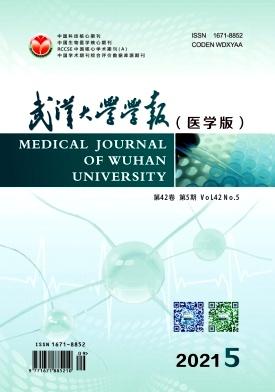Changes of antibodies in COVID‑19 patients: A 10‑month prospective study
Q4 Medicine
引用次数: 1
Abstract
Objective: To explore the law of antibody changes in patients diagnosed with COVID‑19 after the onset of the disease. Methods: A total of 215 patients who were diagnosed with COVID‑19 by RT‑PCR in Wuchang District, Wuhan City, Hubei Province were recruited as the research subjects. The rapid colloidal gold immunochromatography assay was performed on every newly diagnosed patient at the time points of (10±3) d, (100±3) d, (190±3) d, and (280±3) d after the onset of the disease. Results: In terms of antibody types, among the 215 patients,the positive rate of IgM antibodies was 36.7% at (10±3) d. The antibody levels were 22.5%, 5.0%, and 4.7% at (100±3) d, (190±3) d, and (280±3) d respectively. In general, the levels of IgG antibody were high. The positive rate of antibody within (10±3) days was 87.0%, and the rate decreased to 80.8% at (100±3) d, 49.7% and 46.5% at (190±3) d and (280±3) d, respectively. The number of IgM and IgG antibodies homo‑positive samples gradually decreased over time. At the meantime, the proportion of IgM+IgG antibodies both negative samples gradually increases. According to the clinical classification, in the early stage of the disease, the positive rate of IgM antibody was different in patients with different severity of clinical symptoms. The more severe the clinical symptoms, the higher the positive rate of IgM antibodies. Around 190 days after the onset of symptoms, the positive rate of IgG antibodies decreased more slowly in mild and common patients. At the 280‑day during follow‑up, IgM antibodies showed a higher positive rate in severe and critical patients. From the trend of antibody changes in the same patient within 10 months, among the 70 patients, only 55 cases (32.4%) showed continuous positive in IgG antibody, with 77 cases (45.3%) in the IgG antibody positive‑to‑negative group,and 21 cases (12.4%) in the IgG antibody positive‑to‑negative‑to‑positive group. Three cases (1.8%) showed IgG antibody negative converting to positive. However, there were 14 cases (8.2%) remaining with negative IgG antibody. For IgM antibodies, 97 cases (57.1%) were persistently negative, wth 5 cases (2.9%) in the negative‑to‑positive group, and 65 cases (38.2%) in the positive‑to‑negative group. IgM antibody continued to be positive within 10 months has not been observed yet, and there were 3 cases (1.8%) in the IgM antibody positive‑to‑negative‑to‑positive group. Conclusion: After the new coronavirus infection, the serological response is unstable. In the early stage of the disease, antibody detection has important auxiliary value for the diagnosis of the disease;but in the late stage, the diagnostic value is not great. The antibody response may be positively correlated with the severity of the disease. Nearly 50% of patients can remain positive for IgG antibodies within 10 months, which indicates that nearly half of patients recovering from COVID‑19 can obtain longer‑lasting immunity. However, IgG antibodies in some patients continue or eventually become negative. Whether such patients can get immunity remains to be observed and studied. © 2021, Editorial Board of Medical Journal of Wuhan University. All right reserved.COVID - 19患者抗体变化:一项为期10个月的前瞻性研究
目的:探讨确诊COVID - 19患者发病后抗体变化规律。方法:选取湖北省武汉市武昌区经RT - PCR诊断为COVID - 19的215例患者作为研究对象。在发病后(10±3)d、(100±3)d、(190±3)d、(280±3)d对每例新确诊患者进行快速胶体金免疫层析分析。结果:从抗体类型来看,215例患者(10±3)d时IgM抗体阳性率为36.7%,(100±3)d、(190±3)d和(280±3)d时抗体水平分别为22.5%、5.0%和4.7%。总体而言,IgG抗体水平较高。(10±3)d抗体阳性率为87.0%,(100±3)d抗体阳性率为80.8%,(190±3)d抗体阳性率为49.7%,(280±3)d抗体阳性率为46.5%。随着时间的推移,IgM和IgG抗体阳性样本的数量逐渐减少。同时,IgM+IgG抗体双阴性样本所占比例逐渐增加。根据临床分类,在疾病早期,不同临床症状严重程度的患者IgM抗体阳性率不同。临床症状越严重,IgM抗体阳性率越高。出现症状后190天左右,轻、普通患者IgG抗体阳性率下降较慢。随访280天,重症和危重症患者IgM抗体阳性率较高。从同一患者10个月内抗体变化趋势看,70例患者中IgG抗体持续阳性的只有55例(32.4%),其中IgG抗体由阳性转为阴性组77例(45.3%),IgG抗体由阳性转为阴性转为阳性组21例(12.4%)。IgG抗体阴性转阳性3例(1.8%)。但仍有14例(8.2%)IgG抗体阴性。IgM抗体持续阴性97例(57.1%),阴性转阳性组5例(2.9%),阳性转阴性组65例(38.2%)。未见IgM抗体持续10个月呈阳性,IgM抗体阳性-阴性-阳性组有3例(1.8%)。结论:新型冠状病毒感染后,血清学反应不稳定。在疾病的早期,抗体检测对疾病的诊断有重要的辅助价值,但到了晚期,诊断价值就不大了。抗体反应可能与疾病的严重程度呈正相关。近50%的患者可以在10个月内保持IgG抗体阳性,这表明近一半从COVID - 19恢复的患者可以获得更持久的免疫力。然而,一些患者的IgG抗体持续或最终变为阴性。这类患者能否获得免疫还有待观察和研究。©2021,武汉大学医学杂志编辑委员会。版权所有。
本文章由计算机程序翻译,如有差异,请以英文原文为准。
求助全文
约1分钟内获得全文
求助全文

 求助内容:
求助内容: 应助结果提醒方式:
应助结果提醒方式:


